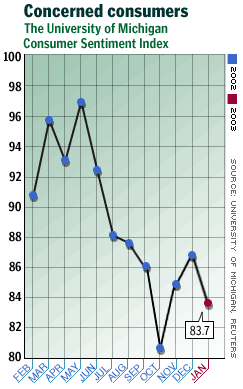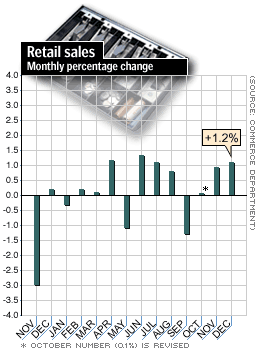NEW YORK (CNN/Money) - This week could be critical for U.S. consumers, the life-blood of the world's largest economy, whose spending has persisted through a recession, layoffs, terror attacks, corporate malfeasance and other horrors.
For starters, consumers will be hearing ad nauseam throughout the week about Iraq, the current poster child for the Axis of Evil.
Chief United Nations weapons inspector Hans Blix started things off Monday by detailing Iraq's failures of cooperation, and President Bush is expected to spend a lot of time in his State of the Union address Tuesday talking tough about how he's willing to go to war if Iraq doesn't straighten up.

Such talk seems unlikely to inspire Americans to spend a bunch of money.
"It's going to bother consumers," said Kevin Logan, senior market economist at Dresdner Kleinwort Wasserstein. "When you look at consumer confidence over time, the main things that affect it are employment and income; but there are other events that can affect confidence, if only temporarily, and war is clearly one of them."
Clearly, talk of war has already weighed on spending by American businesses. While consumer spending fuels more than two-thirds of the nation's economy, businesses need to start spending, and hiring more workers, if the economy is to recover fully from the recession of 2001.
Until uncertainty about a possible war with Iraq, and what might happen in case of war, are cleared up, businesses won't have much appetite for expansion, especially when they've got a glut of excess capacity and they're squeezing plenty of work out of the employees they haven't let go.
"Both consumer and business confidence is depressed because of uncertainty surrounding the war," said Sung Won Sohn, chief economist at Wells Fargo & Co. "If we can somehow bring closure to the war situation, I would expect confidence to improve dramatically, taking with it the economy and the stock market."
| Related stories
|

|
|
|
|
Two reports this week will help economists see how talk of war and other factors have weighed on consumers so far.
On Tuesday, the Conference Board, an independent research firm, releases its closely watched monthly report on consumer confidence. On Friday, the University of Michigan offers its own measure of consumer sentiment. Economists, on average, expect both gauges to fall, according to Briefing.com.
Of course, some economists think those declines could have more to do with the 200,000 jobs slashed from corporate payrolls in November and December than any worries about Iraq.
"The three things that most concern consumers are jobs, jobs and jobs," said Conference Board economist Ken Goldstein.
Can consumers ignore war?
In any event, is all this fuss about the consumer warranted?
Clearly, consumers have had little problem buying homes, if recent reports on new home construction and existing-home sales are any indication.

Though housing makes up a relatively small part of the economy, a strong housing market helps drive up home prices, making consumers feel wealthier. Meanwhile, people need to buy furniture, TVs and other stuff to fill up their new houses.
And consumer spending almost never falls -- the last time it contracted was the fourth quarter of 1991, when the "jobless" recovery from the 1990-91 recession was in full swing.
Recent research by Anthony Chan, chief economist at Banc One Investment Advisors, found that consumer spending doesn't seem to respond much to wars, military conflicts and terror attacks. During U.S. wars in Korea and Vietnam, for example, U.S. consumer spending rose 3.6 percent and 4.8 percent, respectively, on an annualized basis.
During the fourth quarter of 1983, when U.S. Marines were killed by a terror attack in Beirut and the United States invaded Grenada, consumer spending rose 6.8 percent. Consumer spending also rose during the U.S. bombing of Libya in 1986, the Oklahoma City bombing in 1995 and the attack against a U.S. base in Saudi Arabia in 1996.
The common thread uniting these periods of strong consumer spending? All took place during economic expansions.
Attacks, conflicts and wars that took place during economic downturns or periods of sluggish recovery -- including the Persian Gulf War, one of the swiftest and easiest U.S. military victories in history -- all coincided with sluggish consumer spending.
"Consumers are generally unfazed by acts of war, as long as the economic fundamentals are favorable," Chan concluded.
Is debt burden not so bad?
So, the question is -- are the fundamentals favorable?
Some economists would say they are not. Consumer debt is through the roof, with personal bankruptcies and mortgage delinquency rates at or near record levels.
On the other hand, a recent report from the Fed about its 2001 survey of consumer finances showed that the ratio of debt payments to family income actually fell between 1998 and 2001.
What's more, the Fed survey showed that much of the new debt taken on in recent years has been concentrated in high-income households, according to Salomon Smith Barney chief economist Robert DiClemente.
"The wealthiest households took the hardest hit from the equity slide over the past two years and had the largest debt exposure," DiClemente wrote in a research note. "Since these high-income households are in the best position to withstand deterioration in their financial positions, the shocks are likely to have a limited effect on overall consumer spending."
Of course, higher debt levels could have more of an impact on consumers if the hoped-for economic recovery doesn't happen in 2003, leading businesses to further cut costs by cutting more workers.
"Debt is not in itself going to be a cause of contraction in consumer spending, but it could exacerbate any negative change that does occur," said Logan of Dresdner Kleinwort Wasserstein.

|

